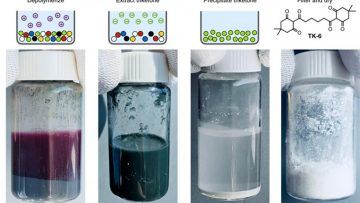From vaaju.com:
 Plastic pollution in the world’s oceans may have an impact of $ 2.5 billion, adversely affecting “almost all marine ecosystem services”, including areas such as fishing, recreation and heritage. But a breakthrough from researchers at Berkeley Lab may be the solution the planet needs for this eye-opening problem – recyclable plastic. The study, published in Nature Chemistry, describes how the researchers could find a new way to assemble plastic and reuse them “to new materials of any color, shape or shape.” “Most plastic materials were never made to be recycled,” says senior author Peter Christensen, a postdoctoral researcher at Berkeley Lab’s molecular foundry, in the statement. “But we have discovered a new way to assemble plastic that takes into account recycling from a molecular perspective.”
Plastic pollution in the world’s oceans may have an impact of $ 2.5 billion, adversely affecting “almost all marine ecosystem services”, including areas such as fishing, recreation and heritage. But a breakthrough from researchers at Berkeley Lab may be the solution the planet needs for this eye-opening problem – recyclable plastic. The study, published in Nature Chemistry, describes how the researchers could find a new way to assemble plastic and reuse them “to new materials of any color, shape or shape.” “Most plastic materials were never made to be recycled,” says senior author Peter Christensen, a postdoctoral researcher at Berkeley Lab’s molecular foundry, in the statement. “But we have discovered a new way to assemble plastic that takes into account recycling from a molecular perspective.”
Plastic pollution in the world’s oceans may have $ 2.5 TRILLION IMPACT, STUDY SAYS
Known as poly (diketoenamine) or PDK, the new type of plastic material can help stop the tide of plastic as the PDK forms can be reversed via a simple acid bath, the researchers believe. “Poly (diketoenamine) s” clicks “together from a variety of triketones and aromatic or aliphatic amines, giving only water as a by-product,” abstraction of the abstract reads. “Recycled monomers can be transformed into the same polymer formulation without loss of performance, as well as other polymer formulations with differentiated properties. The simplicity with which poly (diketoenamine) s can be made, used, recycled and reused without losing value points to new directions in designing durable polymers with minimal environmental impact. ” Unlike conventional plastic, monomers of PDK plastic could simply be recovered and freed from any added additives simply by dumping the material in a very acidic solution.
More here.
